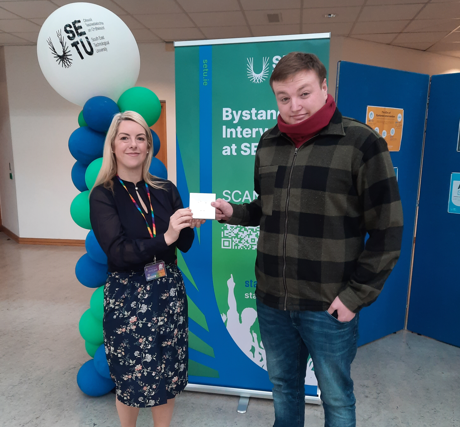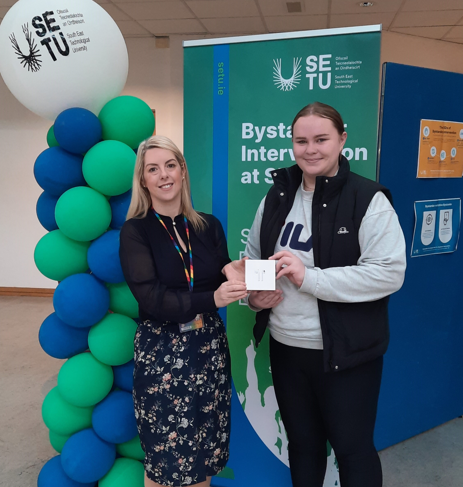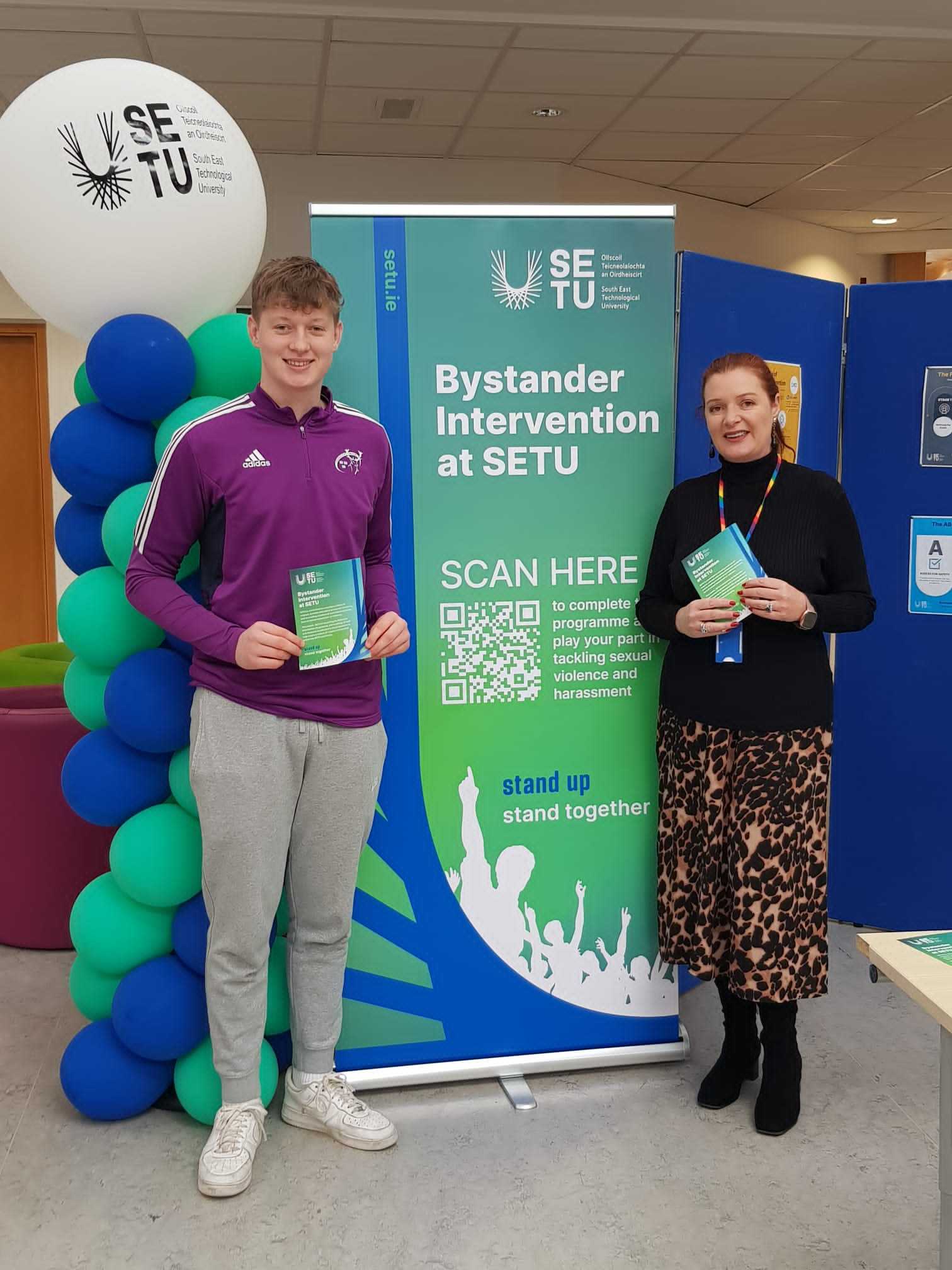SETU is committed to developing and supporting a culture which is safe, supportive, respectful and positive and which actively strives to end all forms of sexual harassment and violence. We are actively working to implement the National Framework for Consent in HEIs: Safe, Respectful, Supportive and Positive: Ending Sexual Harassment in Irish Higher Education Institutions and implementing the recommendations in THEA’s Promoting Consent and Preventing Sexual Violence Report through our SETU Action Plan to Tackle Sexual Violence & Harassment 2021.
SETU has put a cross-institutional Working Group on the Implementation of the Consent Framework (ICF) in place to tackle sexual violence and harassment, and to provide support and reporting options to victims of sexual violence and harassment.
National framework for consent
Speak Out
Speak Out is an online anonymous reporting tool to disclose incidents of bullying, cyberbullying, harassment, discrimination, hate crime, coercive behaviour/control, stalking, assault, sexual harassment, sexual assault, and rape. The tool will help you to find relevant supports and highlight formal reporting procedures, should you wish to use them. It is important to remember that as the tool is completely anonymous, we have no way to identify or contact any member of the University community. Please report one incident, or series of related incidents at a time; this is to ensure that we can understand the nature of your experience.
To make a report if you are a student or staff member please visit the links provided below.
Bystander intervention programme
SETU is committed to ensuring a culture of respect, consent and safety across our university, and to creating a culture of zero tolerance to any form of sexual harassment or violence.
SETU launched its Bystander Intervention Programme and is asking all staff to take the programme to help create a culture of respect and consent within the SETU community.
Why should I get involved?
Everyone in the SETU community has a role to play in preventing sexual violence and harassment. With the right skills, you can make a difference by helping others, stepping in, and speaking up to help prevent sexual harassment or violence.
Prizes:
For the first month of the programme, all staff members who complete the training will automatically be entered in a weekly draw for Apple Air Pods.
What will I learn from the programme?
The online Bystander Intervention programme will teach you
- how to recognise unacceptable behaviour,
- what the barriers to intervention are
- how to overcome them, and
- how to safely and effectively intervene.
It teaches you the skills to know when and how to intervene in a situation of sexual violence or harassment.
You will learn about the 5'D's of Intervening which includes knowing how to non-confrontationally intervene when ‘banter’ goes that bit too far, to empowering you to step in if a friend is in trouble.
The Golden Rule of Bystander Intervention: Only intervene when it is safe for you to do so, and in an emergency call 999 or 112.
Participants who complete the online programme will receive an electronic Certificate of Completion and will also receive a Bystander Intervention Logo to include on their e-mail signature to show their support for the initiative.
Where can I access this programme?
You have automatically been enrolled in SETU's Bystander Intervention Programme on Moodle/Blackboard so you can access it immediately. The programme takes approximately 1-2 hours to fully complete.



Training and awareness
Active* Consent Training
SETU is committed to ensuring that all of our students engage in Active* Consent training to ensure the development of a consent culture on campus. All incoming first year students since 2020-21 have undertaken Active* Consent training as part of their Student Orientation. Additionally, Active* Consent training will be rolled out to all other SETU Waterford students, including postgrad and research students, in the 2021/22 Academic Year.
Students can also take the full Active* Consent E-Learning Module.
Bystander Intervention Training
SETU is committed to rolling out Bystander Intervention training for students across its campuses.
The aim of the Bystander Intervention training is to highlight the danger of normalising and accepting abusive behaviour and through education, inform and empower programme participants to better understand their capacity to intervene as pro-social bystanders. The Bystander Intervention Programme provides students with an understanding of key issues related to consent and the boundaries surrounding sexual assault, rape and abusive relationships. It also enables them to develop key intervention skills which can be utilised in any setting. The programme is led by Professor Louise Crowley of the School of Law, UCC, and will be made available to all students in SETU.
A short introductory Bystander video, which outlines key elements of the training is available here.
It is critical that staff in SETU are aware of key definitions in relation to consent, sexual violence and harassment as well as their role in supporting disclosures, and the wide-spread roll out of training for staff in this area will begin in 2021/22.
Active* Consent Training for Staff
The following video developed by Active* Consent provides important information in relation to concepts, statistics and basic language for staff to help them support students or colleagues who disclose sexual violence to them.
Active* Consent Staff Awareness Raising Video - YouTube
Staff can also take the full Active* Consent E-Learning Module.
Bystander Intervention Training
SETU is committed to rolling out Bystander Intervention training for students and staff across its campuses. The aim of the Bystander Intervention training is to highlight the danger of normalising and accepting abusive behaviour and through education, inform and empower programme participants to better understand their capacity to intervene as pro-social bystanders. The Bystander Intervention Programme provides participants with an understanding of key issues related to consent and the boundaries surrounding sexual assault, rape and abusive relationships. It also enables them to develop key intervention skills which can be utilised in any setting. The programme is led by Professor Louise Crowley of the School of Law, UCC, and will be made available to all staff in SETU.
A short introductory Bystander video, which outlines key elements of the training is available here.
Offering support in the aftermath of rape and sexual assault
Training for designated contact persons and other staff members on offering support in the aftermath of rape and sexual assault was rolled out from October 2021.
The EDI Office is committed to ensuring that all across our community receive timely and appropriate training to ensure support an environment in which equality, diversity and inclusion is valued and respected.
Some of the training offered by the EDI Office includes:
- Equality, Diversity & Inclusion in Higher Education (E-learning programme)
- Module 1: Introduction to EDI
- Module 2: EDI in Recruitment & Selection
- Module 3: Meeting the needs of diverse students in Teaching & Learning Settings
- Module 4: Meeting the needs of the Campus Community
- Meeting the needs of the Campus Community
*Note: These modules may be taken together or individually, depending upon service need.
- Unconscious Bias Training
- Dignity & Respect at Work Training
- Gender Identity & Expression Training
- Active Consent Training (E-learning Programme)
- Bystander Intervention Training (E-learning Programme)
- Offering Support in the Aftermath of Rape and Sexual Assault
Please contact us for further details of the training we provide, or to arrange a training session for your area/department.
Ending sexual violence, prevention and support (ESP) committee
SETU’s Ending Sexual Violence, Prevention and Support (ESP) Committee Working Group oversees the implementation of the Framework for Consent in HEIs; Safe, Respectful, Supportive and Positive: Ending Sexual Harassment in Irish Higher Education Institutions.
Membership comprises of key stakeholders including academics, student support services, EDI, the Student’s Union, HR and external specialist agencies. The vision of the Framework is to ensure an institutional campus culture which is safe, respectful and supportive.





